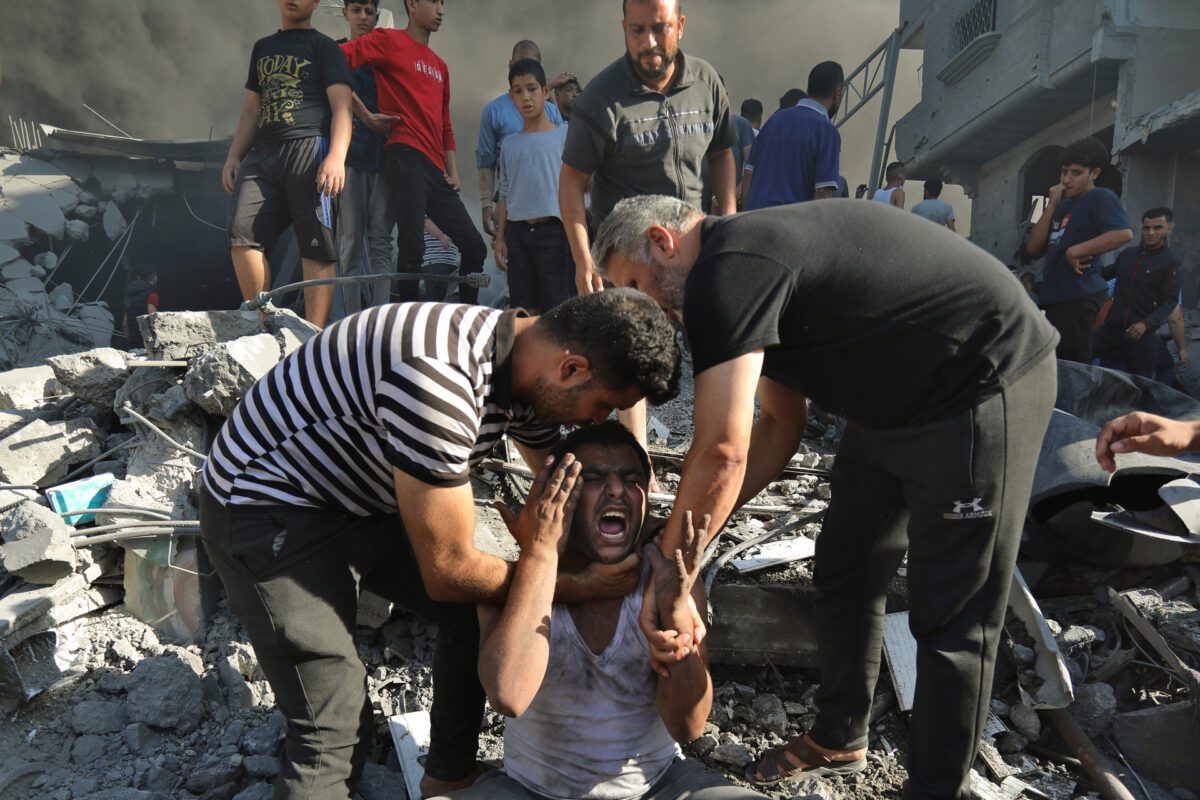OPINION
Before sharing some thoughts about this dreadful conflict, consider three quotes:
“There never was a good war or a bad peace.” — Benjamin Franklin, 1783
“Oppressed people cannot remain oppressed forever.” — Martin Luther King Jr., letter from Birmingham Jail, 1963
“Nothing in the present Charter shall impair the inherent right of individual or collective self-defence if an armed attack occurs” — United Nations Charter, 1945
Over the course of four decades as a journalist, I have covered many armed conflicts. Desert Storm and its aftermath, where I was shot at in Saudi Arabia and held at gunpoint in Syria. I was chased by an armed mob in Somalia and saw my roommate murdered there. I escaped an emergency chopper landing covering the 1994 invasion of Haiti and saw vast fields of death after the 2010 earthquake there.
I stood in the rubble of the World Trade Center days after 9/11, where I handed an airplane part to an FBI agent and consoled a grieving dad, looking in vain for his daughter. I was at Waco and Oklahoma City, at Columbine, the ‘92 L.A. riots, Ferguson, and too many hurricanes and tornadoes to count.
Death, destruction, pain, hate. I’ve been lucky and I’m grateful I’m still alive, which I think means God isn’t done with me yet. I think constantly, too, of the journalists who are dying covering Gaza and Ukraine.
But this Gaza War, now a month old, feels different. It worries me much more than any of those other war zones, not only because of the death toll, but because of the way people here and around the world are reacting. It worries me more than Ukraine, where the world (mostly) is opposing Vladimir Putin’s war of conquest.
Gaza worries me more because it harkens the acceptance of something called “total war,” where targeting of civilian populations is deemed acceptable in the pursuit of victory at all costs.
It’s the way humans regularly slaughtered each other for millenia, including in the Holy Land, often with divine justification.
After World War II — and let’s remember, the U.S. remains the only nation to drop nuclear bombs — the world united in horror for a shared goal against total war. And while some mock the United Nations, the organization’s primary purpose at its founding in 1945 was “to save succeeding generations from the scourge of war.” The U.N. Universal Declaration of Human Rights, one of the noblest documents ever drafted, turns 75 in December.
Yes, there are hundreds of examples of breaches, but there was a consensus that total war can’t be ever allowed again or certainly not be a policy.
But in Ukraine, and now in Gaza, total war is back. Explicitly in the case of Hamas, which reaffirmed this week its commitment to destroy Israel. And yesterday, Israel rejected a humanitarian pause sought by the U.S. as the civilian death toll surpassed 9,000.
If one combatant in a conflict abandons the Geneva Conventions, does that mean the opposing side gets a pass on war crimes it may commit?
If your answer is “yes,” then it’s easy to see where that leads.
And if your answer is “no,” then there is no escaping justice. There is an international court arrest warrant for Vladimir Putin for Ukraine. A war crimes investigation in Palestine has been ongoing for years and the prosecutor last week spoke movingly about what he saw at Egypt’s border with Gaza.
“It’s in times like this,” said Karim A.A. Khan KC, “that we need the law more than ever. Not the law in abstract terms, not the law as a theory for academicians, lawyers and judges. But we need to see justice in action.”
I’m worried because it’s already apparent that global opinion, and global pressure, is shifting after the horrific Oct. 7 slaughter by Hamas. That comes alongside a new wave of scary anti-semitism that seems to be accelerating. It has led to freakish hate and incitement at both left-leaning college campuses and election-denying Fox News (where a “host” started calling CNN journalists “self hating Jews” and the White House responded).
I was in Ireland when the war broke out. I was there for a photo workshop, where instead of war zones and crime scenes, we learnt landscape photography technique from masters. But the other news photographers and I kept checking headlines on our phones as details of the Hamas attack and the Israeli response flowed.
It was surreal, I thought, shooting images at fictional beheading locations featured in Game of Thrones and then reading about Hamas’ atrocities. “Are we headed back to medieval butchery,” I kept asking myself.
I hold dual citizenship. My grandmother fled crushing poverty in 1900, and I grew up with “the Troubles’ as part of my heritage. In Ulster, I saw the “Free Derry” signage and large murals praising Che Guevara, which would make the blood of many Cuban-Ameicans here boil.

Yet despite that boiling hate, the Good Friday accords happened 25 years ago. And now, for the first time in my memory, Ireland is slowly headed to reunification after the bloody 1921 partition, subsequent civil war, and decades of sectarian terrorism.
One of our hosts, a lovely and gentle British woman, said it was hard to stomach the transformation of some bloodthirsty IRA leaders into lionized diplomats, but accepted it as far better than the alternative. If unification happens in Ireland, it will be a one-state solution, achieved with a decrease in religiosity, and an increase in tolerance.
I don’t have illusions that any of that can happen between Israel and Palestinians. It’s far from clear that the “two-state solution,” official U.S. and U.N. policy, is even possible any more, given the extensive Israeli settlement in the West Bank. Dismantling Hamas (which Iran, China, and Russia are supporting) still leaves the question of finding a negotiating partner.
There have been so many peace attempts that have failed. So many political players use religion as a thinly-disguised tool for power — and that seems to be increasing, not decreasing. There are many players — Palestinian, Israeli, Iranian, and others — who don’t want peace — they want total victory, regardless of cost.
Other Arab leaders agree Hamas must be removed, says veteran diplomat Dennis Ross, but are standing on the sidelines, paralyzed by local public opinion.
There may be no way out.
But I won’t give up hope either. And all I can ask is that you do the same.
Invest in Local News for Your Town. Your Gift is tax-deductible
Tony Winton is the editor-in-chief of the Key Biscayne Independent and president of Miami Fourth Estate, Inc. He worked previously at The Associated Press for three decades winning multiple Edward R. Murrow awards. He was president of the News Media Guild, a journalism union, for 10 years. Born in Chicago, he is a graduate of Columbia University. His interests are photography and technology, sailing, cooking, and science fiction.



